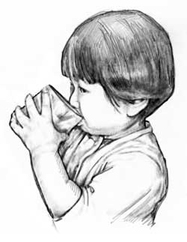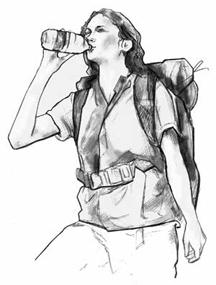Treatment for Diarrhea
 Diarrhea is treated by replacing lost fluids, salts, and minerals to prevent dehydration.
Diarrhea is treated by replacing lost fluids, salts, and minerals to prevent dehydration.
Taking medicine to stop diarrhea can be helpful in some cases. Medicines you can buy over the counter without a prescription include loperamide (Imodium) and bismuth subsalicylate (Pepto-Bismol, Kaopectate). Stop taking these medicines if symptoms get worse or if the diarrhea lasts more than 2 days. If you have bloody diarrhea, you should not use over-the-counter diarrhea medicines. These medicines may make diarrhea last longer. The health care provider will usually prescribe antibiotics instead.
Over-the-counter medicines for diarrhea may be dangerous for babies and children. Talk with the health care provider before giving your child these medicines.
Eating, Diet, and Nutrition
To prevent dehydration when you have diarrhea, it is important to drink plenty of water, but you also need to drink fluids that contain sodium, chloride and potassium.
- Adults should drink water, fruit juices, sports drinks, sodas without caffeine, and salty broths.
- Children should drink oral rehydration solutions — special drinks that contain salts and minerals to prevent dehydration. These drinks include Pedialyte, Naturalyte, Infalyte, and CeraLyte. These drinks are sold in most grocery stores and drugstores.
- bananas
- plain rice
- boiled potatoes
- toast
- crackers
- cooked carrots
- baked chicken without the skin or fat
If a certain food is the cause of diarrhea, try to avoid it.
While you wait for the diarrhea to end, avoid foods that can make it worse:- drinks with caffeine, such as coffee and cola
- high-fat or greasy foods, such as fried foods
- foods with a lot of fiber, such as citrus fruits
- sweet foods, such as cakes and cookies
During or after an episode of diarrhea, some people have trouble digesting lactose, the sugar in milk and milk products. However, you may be able to digest yogurt. Eating yogurt with active, live bacterial cultures may even help you feel better faster.
 When babies have diarrhea, continue breast feeding or formula feeding as usual.
When babies have diarrhea, continue breast feeding or formula feeding as usual.
After you have had diarrhea caused by a virus, problems digesting lactose may last up to 4 to 6 weeks. You may have diarrhea for a short time after you eat or drink milk or milk products.
How to Prevent Diarrhea
Two types of diarrhea can be prevented — rotavirus diarrhea and traveler’s diarrhea.
Rotavirus Diarrhea
Two vaccines, RotaTeq and Rotarix, protect against rotavirus — a common virus that causes diarrhea in babies and children. RotaTeq is given to babies in three doses at 2, 4, and 6 months of age. Rotarix is given in two doses. The first dose is given when the baby is 6 weeks old, and the second is given at least 4 weeks later but before the baby is 24 weeks old. To learn more about rotavirus vaccines, talk with your child’s health care provider. You can also find more information at the Centers for Disease Control and Prevention rotavirus vaccination web page at www.cdc.gov/vaccines/vpd-vac/rotavirus.
RotaTeq and Rotarix only prevent diarrhea caused by rotavirus. Children who have been vaccinated may still get diarrhea from another cause.
Traveler’s Diarrhea
 People may develop traveler’s diarrhea while visiting developing areas of the world such as Latin America, Africa, and southern Asia. Traveler’s diarrhea is caused by eating food or drinking water that contains harmful bacteria, viruses, or parasites.
People may develop traveler’s diarrhea while visiting developing areas of the world such as Latin America, Africa, and southern Asia. Traveler’s diarrhea is caused by eating food or drinking water that contains harmful bacteria, viruses, or parasites.
- Do not drink tap water, use tap water to brush your teeth, or use ice cubes made from tap water.
- Do not eat or drink unpasteurized milk or milk products.
- Do not eat raw fruits and vegetables unless they can be peeled and you peel them yourself.
- Do not eat raw or rare meat and fish.
- Do not eat meat or shellfish that is not hot when served to you.
- Do not eat food sold by street vendors.
You can drink bottled water, carbonated soft drinks, and hot drinks such as coffee and tea.
Before traveling outside the United States, talk with your health care provider. Your health care provider may suggest taking medicine with you. In some cases, taking antibiotics before traveling can help prevent traveler’s diarrhea. And early treatment with antibiotics can shorten an episode of traveler’s diarrhea.
Points to Remember
- Diarrhea is frequent, loose, and watery bowel movements.
- Acute diarrhea is a common problem. It usually lasts only 1 or 2 days, but it may last longer.
- Being dehydrated means your body does not have enough fluid to work properly. Dehydration can be serious, especially for children, older adults, and people with weakened immune systems.
- Diarrhea is treated by replacing lost fluids, salts, and minerals.
- See your health care provider if you have signs of dehydration, diarrhea for more than 2 days, severe pain in your abdomen or rectum, a fever of 102 degrees or higher, stools containing blood or pus, or stools that are black and tarry.
- Take your child to a health care provider right away if your child has signs of dehydration, diarrhea for more than 24 hours, a fever of 102 degrees or higher, stools containing blood or pus, or stools that are black and tarry.
- Two types of diarrhea can be prevented — rotavirus diarrhea and traveler’s diarrhea.
Diarrhea also called: Dysentery, The runs, The trots
